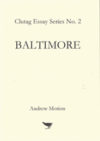Description
On the poet’s leaving his native land to settle in America. An ideal companion to his contribution to the Clutag Five Poems series.
(Clutag Press, 2017)
£5.00
On the poet’s leaving his native land to settle in America. An ideal companion to his contribution to the Clutag Five Poems series.
On the poet’s leaving his native land to settle in America. An ideal companion to his contribution to the Clutag Five Poems series.
(Clutag Press, 2017)

